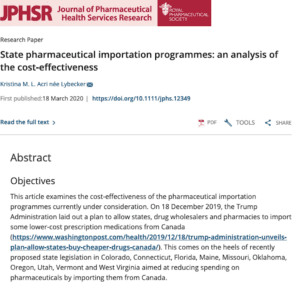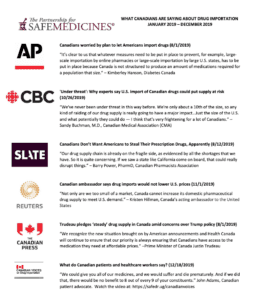May 20, 2020 video: Maine Importation Update
In June 2019, the governor of Maine signed LD 1272, An Act To Increase Access to Low-cost Prescription Drugs into law. LD 1272 required the state to submit its state importation plan to the U.S. Department of Health and Human Services (HHS) by May 1, 2020. Maine met its deadline even though federal rulemaking for state importation has not been finalized. However, the state’s application was incomplete.
All proposed state importation programs must comply with the Medicare Modernization Act of 2003 (MMA), which stipulates that any program must (1) pose no additional risk to patient safety and (2) produce significant savings for consumers. Maine’s submission does neither. Instead, the state’s policy-makers argue against patient-safety measures in the MMA and proposed rulemaking, and fail to offer enough details to demonstrate savings. What follows is a discussion of some of the issues we found.
Given the deep structural flaws in both the idea of importing medicine from Canada and in Maine’s application to do so, we have to wonder if there is a better use of Maine taxpayer dollars than to continue to pursue this idea.
Maine wants to expand importation beyond Canada, an even more dangerous idea
”If the Administration is considering wide-scale importation of prescription drugs...it should engage with Congress to change the federal law to permit importation of drugs from any country where there is an FDA-registered manufacturing facility.”
The MMA only allows the importation of drugs from Canada. However, Canada opposes U.S. states’ schemes to import its medicines, writing “Canada’s drug market is too small to meet American consumer demand for prescription drugs or have an impact on high drug prices. Implementation of the proposed rule could exacerbate drug shortages in Canada, putting the health of Canadians at risk.” Faced with Canadian opposition, Maine and other states want to move the goalposts on patient safety. Colorado has already introduced legislation to import prescription drugs from countries other than Canada, and Maine is explicit about wanting to expand its sources when buying medicines from overseas.
Maine wants to import drugs the MMA excluded, endangering patient safety
“The Administration should also consider working with Congress to permit these drugs to be safely included in a State importation program, in order to maximize savings available.”
Maine calls out biologics and intravenously injected drugs as ones it would like to be able to import. The MMA limits which kinds of drugs can be imported: controlled substances, biologics, infused drugs, intravenously injected drugs, drugs inhaled during surgeries, and parenteral drugs are excluded from the possibility of importation because of safety concerns. Many injected drugs and biologics are temperature-sensitive, and improper handling of biologics will destroy the medicine. Biologics are also some of the most expensive drugs, so being able to import those would help to boost savings, but patient safety should never take the back seat to savings. When congress drafted the Medicare Modernization Act in 2003, they excluded biologics because of the risk of counterfeiting and degradation.
Maine lobbies for longer supply chains
“...Maine will need a more diverse supply chain in Canada – to purchase one product from multiple licensed foreign sellers that have purchased directly from a manufacturer, or a licensed foreign seller(s) that has purchased the licensed product from the supplier that bought directly from a manufacturer.”
 Maine pushes back on the proposed federal rulemaking’s requirement that a drug importation program have a short supply chain. The rulemaking requires a single foreign seller who purchased directly from the drug manufacturer and sells directly to one wholesale importer contracted by the state. What the state fails to understand is that the entire Canadian drug supply chain is a short supply chain. Canada has three major wholesalers and no real secondary wholesalers like we have here in the U.S. The three major wholesalers, AmerisourceBergen, Cardinal Health, and McKesson, all filed comments to HHS expressing concerns about the impact drug importation would have on patient safety and drug supply chain security.
Maine pushes back on the proposed federal rulemaking’s requirement that a drug importation program have a short supply chain. The rulemaking requires a single foreign seller who purchased directly from the drug manufacturer and sells directly to one wholesale importer contracted by the state. What the state fails to understand is that the entire Canadian drug supply chain is a short supply chain. Canada has three major wholesalers and no real secondary wholesalers like we have here in the U.S. The three major wholesalers, AmerisourceBergen, Cardinal Health, and McKesson, all filed comments to HHS expressing concerns about the impact drug importation would have on patient safety and drug supply chain security.
Long supply chains are challenging to regulate and were the root cause of the counterfeit crisis in the early 2000s as documented in Katherine Eban's 2006 book Dangerous Doses. Lengthening the supply chain would make it far more likely that we would end up with counterfeits as the trail from factory floor to pharmacy shelf would become impossible to trace.
Maine’s application does not demonstrate patient savings
“...a final list of drugs to be imported under the auspices of the Maine wholesale program will be provided to USDHHS for approval...The estimated, aggregate amount of savings on drug spend in dollars and as a percentage of health plan drug spend will be provided to USDHHS at that time.”
Because they did not offer a list of drugs which were likely candidates for importation or clearly articulate the operating costs of the program, Maine fails to demonstrate the significant savings the MMA requires and therefore its application is invalid. In the application, Maine describes the process by which they might choose approximately 30 medicines to import, but has not gotten any closer to showing that drug importation works than when LD 1272 was passed in 2019.
Additional outstanding issues with Maine’s submittal
Testing costs: Although there is mention of testing, nowhere in the submittal does the state address the very real cost of testing as required by the MMA. Colorado College economist Dr. Kristina M.L. Acri née Lybecker has done an analysis of the cost of testing for state importation programs and her analysis says it’s going to be very expensive. Read her full paper which was recently published in the Journal of Pharmaceutical Health Services Research.
Licensing challenges: The state does not discuss how a Maine licensing program would be able to prosecute bad actors in Canada. The federal government with all of its powers has repeatedly struggled to bring Canadians into the U.S. to face prosecution. Without this important detail understood, the application should be rejected.
Impact on Maine pharmacies: The proposal suggests that pharmacies, hospitals, and dispensing physicians would have to stock a U.S. and imported version of any drug the state decides to import. During stakeholder meetings, pharmacists were concerned about storing this additional medicine. The state acknowledges that they are creating this situation, but offers no way to address it. Additionally, the state wants to require that pharmacies only be reimbursed at the actual acquisition cost of the medications plus a dispensing fee. This could be very hard on community pharmacies, which saw lower profits in 2018 than they did in 2009.
Importation challenges: The state is concerned that any drugs imported by the state may be assigned to a Customs and Border Protection port of entry that lacks a close facility that could do these important tasks, which would in turn increase program costs.
Track-and-trace compliance: Given that Canada does not have a track-and-trace system, the state of Maine failed to demonstrate how their drug importation would comply with DSCSA, which requires a record of every entity that handles a pharmaceutical from manufacturing to dispensing. During debate over this legislation sponsors promised any medicine would comply with track and trace. Backing away from this promise is a betrayal of Maine patients.
Impact of importation on Canadian drug supply: While the state of Maine “is confident that importing a limited number of drug products for some portion of Maine’s 1.35 million residents will not create supply shortages for Canada’s 38 million residents,” Canada already deals with ongoing drug shortages and has said they want no part of American plans to import their medicines, including Maine’s. Without a solution to this problem, this proposal is not workable.
Practical and legal challenges to the proposed federal rulemaking: Canada is not the only thorny issue for proponents of drug importation. An analysis in the May 7, 2020 New England Journal of Medicine pointed out practical and legal challenges to the proposed federal rulemaking. The authors conclude that importation would not lower drug prices and left them questioning how HHS could certify to Congress that a hypothetical state plan would save money and pose no health risks.
Maine acknowledged in their proposal that the lack of finalized federal rules would require an additional submittal on its part at a later date. However, what the state did submit was nowhere near a finalized plan. Critical components and issues were kicked down the road or completely disregarded. The taxpayers of Maine and every other state contemplating drug importation should be asking why their tax dollars are being wasted to develop programs that will never be implemented because of the objection of Canada and the impossibility of complying with even the basic requirements of the law.
Sources for this week’s video:
- Jennifer Levitz and Timothy Martin, "Maine to Allow Prescription-Drug Imports," The Wall Street Journal, October 11, 2013.
- Jackie Farwell, "Judge Overturns Maine Law Allowing Prescription Drug Imports," Bangor Daily News, .
- "Myth: We Are Getting the Same Drugs Canadians Take," The Partnership for Safe Medicines.
- Application to Operate a Section 804 Prescription Drug Importation Program, Maine Department of Health and Human Services, May 1, 2020.
- Maine L.D. 1272, An Act To Increase Access to Low-cost Prescription Drugs, approved June 24, 2019.
- H.R.1 - Medicare Prescription Drug, Improvement, and Modernization Act of 2003.
- Comments on Proposed Rule: Importation of Prescription Drugs: The Canadian Government
- Drug Shortages Canada
- Katie May, "Drug Shortages Push Federal Government to Seek New Suppliers," The Winnipeg Free Press, May 13, 2020.
- "Pharmacists See Spikes in Drug Shortages During Pandemic," Canadian Pharmacists Association, April 17, 2020.
- "Canada to Allow Bans on Bulk Drug Exports," CBC, June 29, 2005.
- J. Craig Anderson, "Think Tank Projects $1.2 Billion Budget Shortfall for Maine," Portland Press Herald, May 6, 2020.
- Scott Thistle, "State Budget Crisis Looms in Maine as Pandemic Rages," Portland Press Herald, April 27, 2020.
- Jordan Bailey, "Small Businesses in Maine Struggle to Make PPP Loans Work," Portland Phoenix, April 29, 2020.
- Allison Winter, "We Are Running Out of Time’: Maine Farmers Scramble as Pandemic Persists," Maine Beacon, May 4, 2020.
- Peter McGuire, "Vacationland Threatened by Coronavirus Pandemic," Portland Press Herald, April 19, 2020.
Additional sources for this blog post:
- Colorado SB20-119, Expand Canadian Prescription Drug Import Program, introduced in the 2020 Regular Session.
- Claire Sykes, "Time- and Temperature-Controlled Transport: Supply Chain Challenges and Solutions," Pharmacy and Therapeutics, March 2018.
- M Reza Nejadnik, et al., "Postproduction Handling and Administration of Protein Pharmaceuticals and Potential Instability Issues," Journal of Pharmaceutical Sciences, August 2018.
- Comments on Proposed Rule: Importation of Prescription Drugs: AmerisourceBergen, Cardinal Health, McKesson.
- Katherine Eban, Dangerous Doses, 2006.
- Dr. Kristina Acri, "State Pharmaceutical Importation Programmes: an Analysis of the Cost‐Effectiveness," Journal of Pharmaceutical Health Services Research, March 2020.
- "January 18, 2019: Medical Company Executive Sentenced for Smuggling $18 Million in Misbranded Pharmaceuticals into United States," a U.S. Department of Justice press release republished by the U.S. Food and Drug Administration.
- The Case Against Canada Drugs, The Partnership for Safe Medicines.
- "Canadian Internet Pharmacy Founder Gets 4 Years in Counterfeit Drugs Case," The Partnership for Safe Medicines, January 18, 2013.
- 2019 NCPA Digest, National Community Pharmacists Association.
- Drug Supply Chain Security Act (DSCSA), The U.S. Food and Drug Administration.
- Rachel E. Sachs, J.D., M.P.H., and Nicholas Bagley, J.D, "Importing Prescription Drugs from Canada — Legal and Practical Problems with the Trump Administration’s Proposal," New England Journal of Medicine, May 2020.
Viewers may note one of the books over Shabbir's left shoulder, which is the graphic novel Hostage by Guy Delisle. It chronicles the kidnapping by and eventual escape of a Doctors without Borders employee from Chechneyan paramilitaries in 1997.

